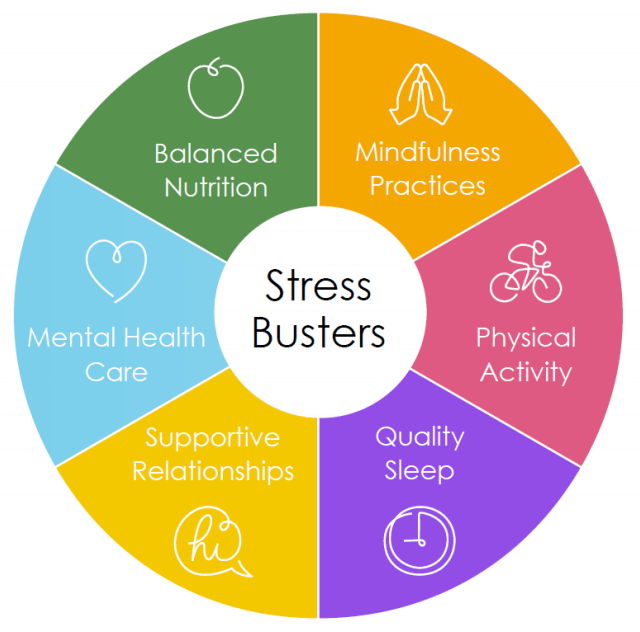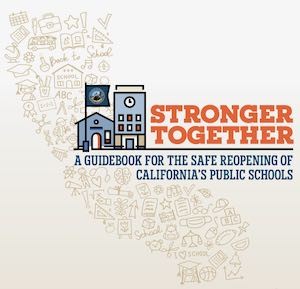Stress, Anxiety and the Start of School

Pandemic Kids Need Emotional Support
A new school year is always a little emotionally challenging. New class, new friends, maybe even a new school. But this year… OMG. This year we have it all plus pandemic stress and racial trauma. Children’s lives have changed dramatically since schools shut down in March.
Parents and families now struggle with issues they have never faced before.
- Is it really safe to send my children to any in-person learning?
- How can I go to work and take care of my kids at home at the same time?
- Help! I am not a teacher! When will school finally open in person?
Stress and anxiety can have long-lasting effects. Schools now must focus not only on how and what to teach, but on making sure that kids are in a good frame of mind to learn.
What Are Schools Doing to Help?
Helping students through stress and anxiety is integral to California’s plans for reopening schools. Getting this right requires safe, positive and supportive relationships between students and staff, as this brief video from Edutopia demonstrates:
To address this year’s unique challenges, California has suspended the usual district accountability plan known as the LCAP. In its place, this year school districts are required to explain how they will monitor and support mental health and social emotional well-being as part of a new Learning Continuity and Attendance Plan.
[A description of how the LEA will monitor and support mental health and social and emotional well-being of pupils and staff during the school year, including the professional development and resources that will be provided to pupils and staff to address trauma and other impacts of COVID-19 on the school community.]
The message from the state is clear: Make mental health a priority! See box for the state's guidance about how school districts and charter schools (LEAs, technically) should respond to the Mental Health and Social and Emotional Well-Being section of the template.
Parents: Get Engaged!
Parents probably have greater insight into the needs of their children than anyone else. Contributing to the Learning Continuity Plan is your chance to help shape your school district’s support for the mental health and social-emotional well-being of students and staff.
Your school district must consult with the school community in developing the plan, which must be presented at a public hearing for review and comment. Here are some questions to ask at a public hearing or community convening. Even if you don’t get a clear answer right away, these questions will help your schools develop a plan and response.
|
Questions to ask about your district's Learning Continuity Plan |
|---|
|
How will my school maintain relationships and connectedness when the physical school buildings are closed? |
|
What will my school do to support student wellness everyday? |
|
Is my school screening students for social emotional needs? |
|
Is there a mental health professional available in our school? |
|
How is my school working with community partners to support the mental wellness of staff and students? |
|
Will my school provide information to help me access mental health and wellness resources? |
|
Are stress management or mindfulness practices included in the daily classroom routine? |
|
How are district funding, policies, and programs aligned to fully support mental wellness for students and staff? |
|
How will my teacher be able to tell if my child is experiencing difficulties without in-person contact? |
|
How often will a teacher check in with me to discuss my child's needs? |
Resources for Parents and Educators

Distance Learning Support
The California Department of Education provides a variety of resources for educators and parents/guardians on self care, maintaining strong relations and connections as well as social emotional learning in virtual classrooms.
Among the resources available is the California Surgeon General's Playbook.
“The good news is there are simple things you can do every day, at home, to protect your health. Safe, stable, and nurturing relationships can protect our brains and bodies from the harmful effects of stress and adversity.”

Reopening Schools Guidebook
Stronger Together, California’s Guidebook for the Safe Reopening of Schools, includes a comprehensive checklist on mental health and social emotional well-being that your school and district should review. (Look on page 34.)
|
Additional Guidance |
|---|
|
Video Series How Learning Happens explores how educators can integrate social, emotional, and academic skills to support and guide diverse learners. |
|
Back to School Resources from Child Mind Institute Practical tools and expert advice to help you make the best of going back to school during the coronavirus crisis. |
|
Relationship Mapping Strategy, a strategy developed by the Harvard Graduate School of Education, helps ensure that each student has a relationship with at least one caring adult in school. |
|
Building Positive Conditions for Learning at Home, developed by American Institutes for Research, provides strategies and resources for families and caregivers working at home. The article is also available in Spanish. |
|
Mentoring can bring a personal touch to distance learning. Recruit mentors from school employees whose duties have changed or been sidelined and reassign them as mentors. |
 This post was written by Shereen Walter and Carol Kocivar. Shereen got involved in PTA for the same reason many parents do, to make a difference at her own child’s school. She has found a passion for helping all children and families in California with her work as the Community Concerns Advocate and as the VP of Legislation for CAPTA. She spoke at the 2020 Ed100 Academy for California Student Leaders.
This post was written by Shereen Walter and Carol Kocivar. Shereen got involved in PTA for the same reason many parents do, to make a difference at her own child’s school. She has found a passion for helping all children and families in California with her work as the Community Concerns Advocate and as the VP of Legislation for CAPTA. She spoke at the 2020 Ed100 Academy for California Student Leaders.Tags on this post
Health PandemicAll Tags
A-G requirements Absences Accountability Accreditation Achievement gap Administrators After school Algebra API Arts Assessment At-risk students Attendance Beacon links Bilingual education Bonds Brain Brown Act Budgets Bullying Burbank Business Career Carol Dweck Categorical funds Catholic schools Certification CHAMP Change Character Education Chart Charter schools Civics Class size CMOs Collective bargaining College Common core Community schools Contest Continuous Improvement Cost of education Counselors Creativity Crossword CSBA CTA Dashboard Data Dialogue District boundaries Districts Diversity Drawing DREAM Act Dyslexia EACH Early childhood Economic growth EdPrezi EdSource EdTech Education foundations Effort Election English learners Equity ESSA Ethnic studies Ethnic studies Evaluation rubric Expanded Learning Facilities Fake News Federal Federal policy Funding Gifted Graduation rates Grit Health Help Wanted History Home schools Homeless students Homework Hours of opportunity Humanities Independence Day Indignation Infrastructure Initiatives International Jargon Khan Academy Kindergarten LCAP LCFF Leaderboard Leadership Learning Litigation Lobbyists Local control Local funding Local governance Lottery Magnet schools Map Math Media Mental Health Mindfulness Mindset Myth Myths NAEP National comparisons NCLB Nutrition Pandemic Parcel taxes Parent Engagement Parent Leader Guide Parents peanut butter Pedagogy Pensions personalized Philanthropy PISA Planning Policy Politics population Poverty Preschool Prezi Private schools Prize Project-based learning Prop 13 Prop 98 Property taxes PTA Purpose of education puzzle Quality Race Rating Schools Reading Recruiting teachers Reform Religious education Religious schools Research Retaining teachers Rigor School board School choice School Climate School Closures Science Serrano vs Priest Sex Ed Site Map Sleep Social-emotional learning Song Special ed Spending SPSA Standards Strike STRS Student motivation Student voice Success Suicide Summer Superintendent Suspensions Talent Teacher pay Teacher shortage Teachers Technology Technology in education Template Test scores Tests Time in school Time on task Trump Undocumented Unions Universal education Vaccination Values Vaping Video Volunteering Volunteers Vote Vouchers Winners Year in ReviewSharing is caring!
Password Reset
Search all lesson and blog content here.
Login with Email
We will send your Login Link to your email
address. Click on the link and you will be
logged into Ed100. No more passwords to
remember!














Questions & Comments
To comment or reply, please sign in .
Alisa Sabshin-Blek August 25, 2020 at 9:29 pm